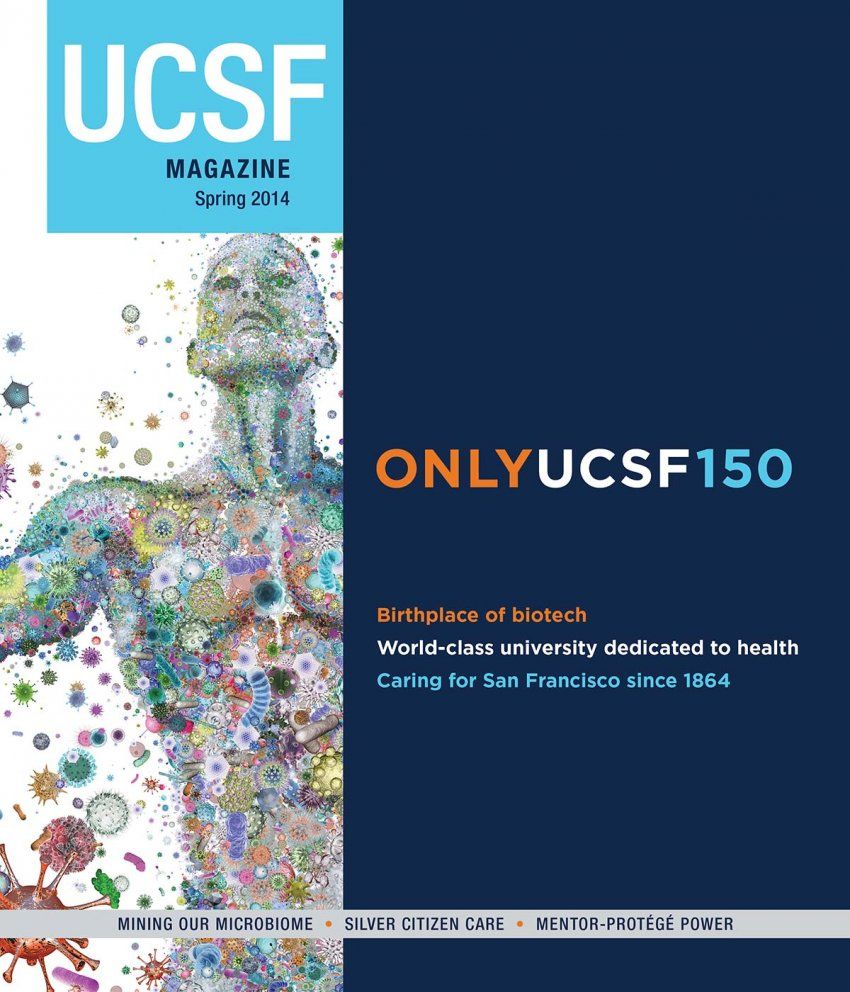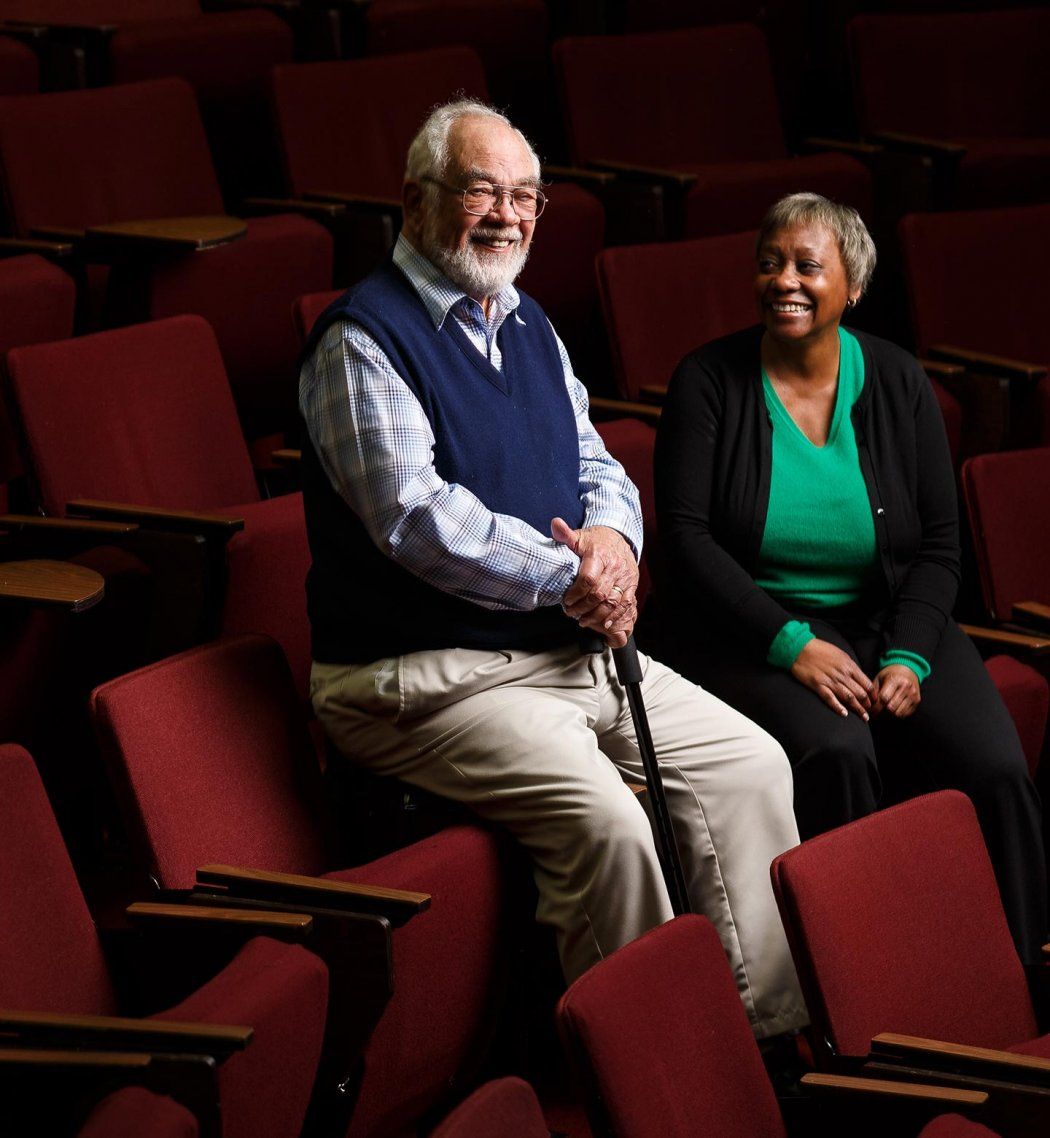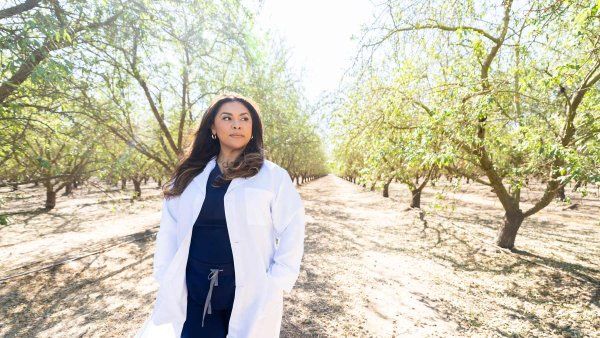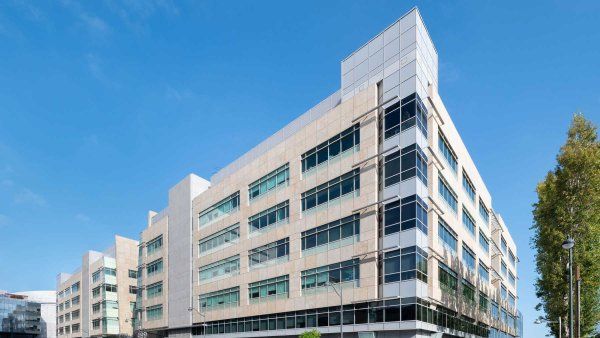
Whether it takes the form of a leg up, a door opened, a steadying hand, or an affirmation, mentorship is intrinsic to UC San Francisco. Such alliances are essential to guiding a protégé along the path to professional mastery. They may take root in a classroom, in an operating room, at an alumni gathering, or in a lab.
The mentors and mentees featured here have played an integral role in each other’s lives – and likely will for a long time to come.
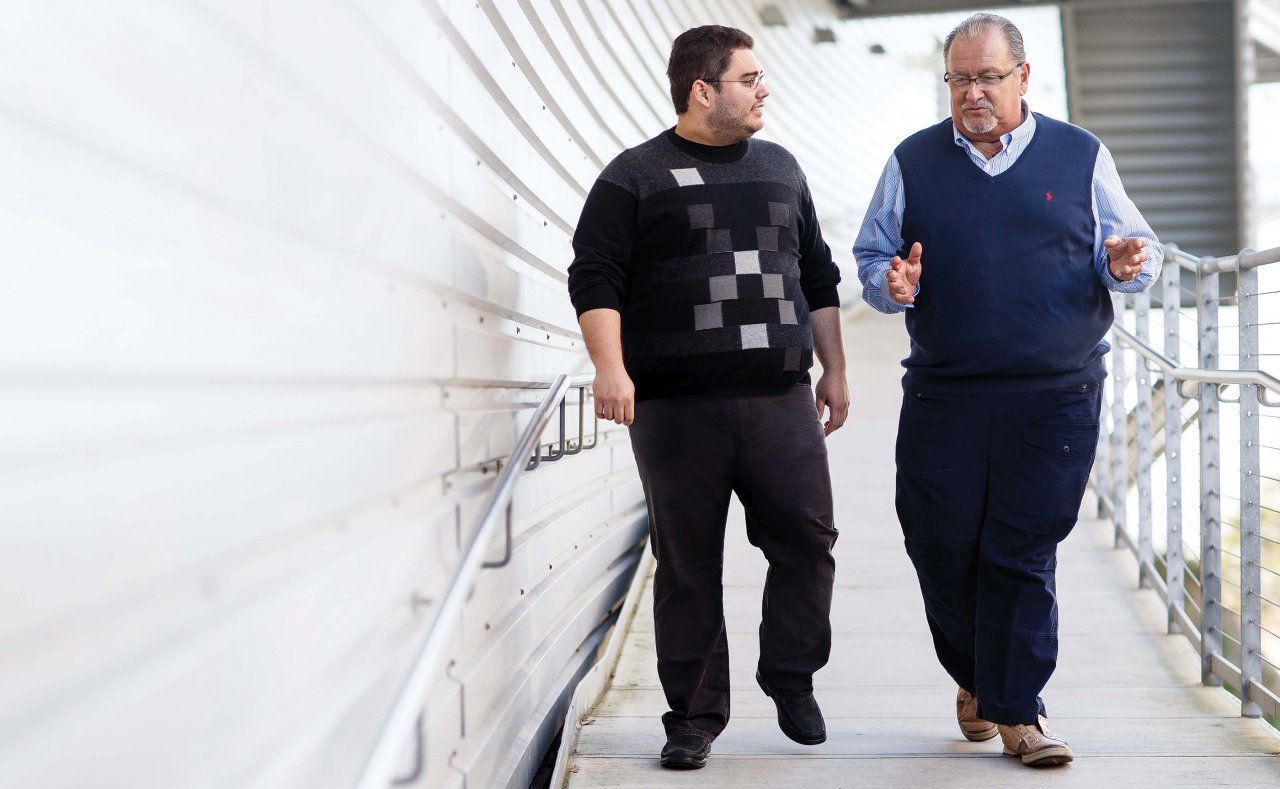
Ruben Espinoza and Michael Lopez, photographed at the UCSF’s Ray and Dagmar Dolby Regeneration Medicine Building on Feb. 21. Photo: Steve Babuljak
Michael Lopez, DDS ’74; owner, Mountain View Family Dentistry, Mountain View, Calif.; member, UCSF Dental Alumni Association (DAA) Executive Council; chair, DAA Student Relations Committee; member, UCSF School of Dentistry Dean’s Advisory Board; member, Alumni Association of UCSF Board and Diversity Committee; trustee, Hispanic Dental Association (HDA); member, HDA National Faculty Advisor Committee
Ruben Espinoza, third-year student, UCSF School of Dentistry; recipient, Dean’s Scholarship for Opportunity; class representative and past co-president, UCSF Chapter, Hispanic Student Dental Association
Lopez: When Ruben comes upon good fortune, he asks himself how it can be shared. That’s just how he thinks. He is spectacular – so bright and so committed.
Espinoza: The first time I spoke to Michael was on the phone, when I was trying to choose what dental school to attend. During the conversation I kept thinking, “Sure, I have people who are there for me. But this guy? He is actively reaching out and trying to connect with me.” That was a first.
Lopez: Building community is so important. The wonder of this person here is that he was instrumental to fulfilling a lot of the social contracts his class made together. The Hispanic Student Dental Association flourished with Ruben and his Hispanic compatriots in the class.
Espinoza: We began with eight students, now we have 60. It’s not exclusive to Hispanic people – we have opened the door to others. We do social and community outreach events, like free dental screenings for kids in struggling neighborhoods. I didn’t come from a privileged background, so I can relate to the need.
Lopez: I have learned that when you see how people treat others around them, you get an inclination about how they will be around people in our community and in our society. I am so proud of what he has already accomplished, and he hasn’t even graduated.
Espinoza: Whenever Dr. Lopez is here, he brings up the three R’s – that’s his thing: respect, relationships, reflection.
Lopez: I drill it into all our students: Have respect for yourself [and] the people around you – your classmates, faculty, the community. Create and value relationships. And take the time to reflect on your motivation.
Espinoza: He always brings everything back to the importance of meaning and happiness in everyone’s lives and how that translates into being successful. That and the three R’s summarize Dr. Lopez for me.
Lopez: Being associated with meaning and happiness? It doesn’t get better than that! You don’t wait for the opportunity to help each other. You create the opportunity and the culture of caring. Ruben is part of that.
Espinoza: Dr. Lopez has always been there for us. In a few months, we will graduate and be dentists, and then we will be colleagues.
Lopez: Ruben, from the first day I met you, we were colleagues. We have always been colleagues. That’s the magic of it all.
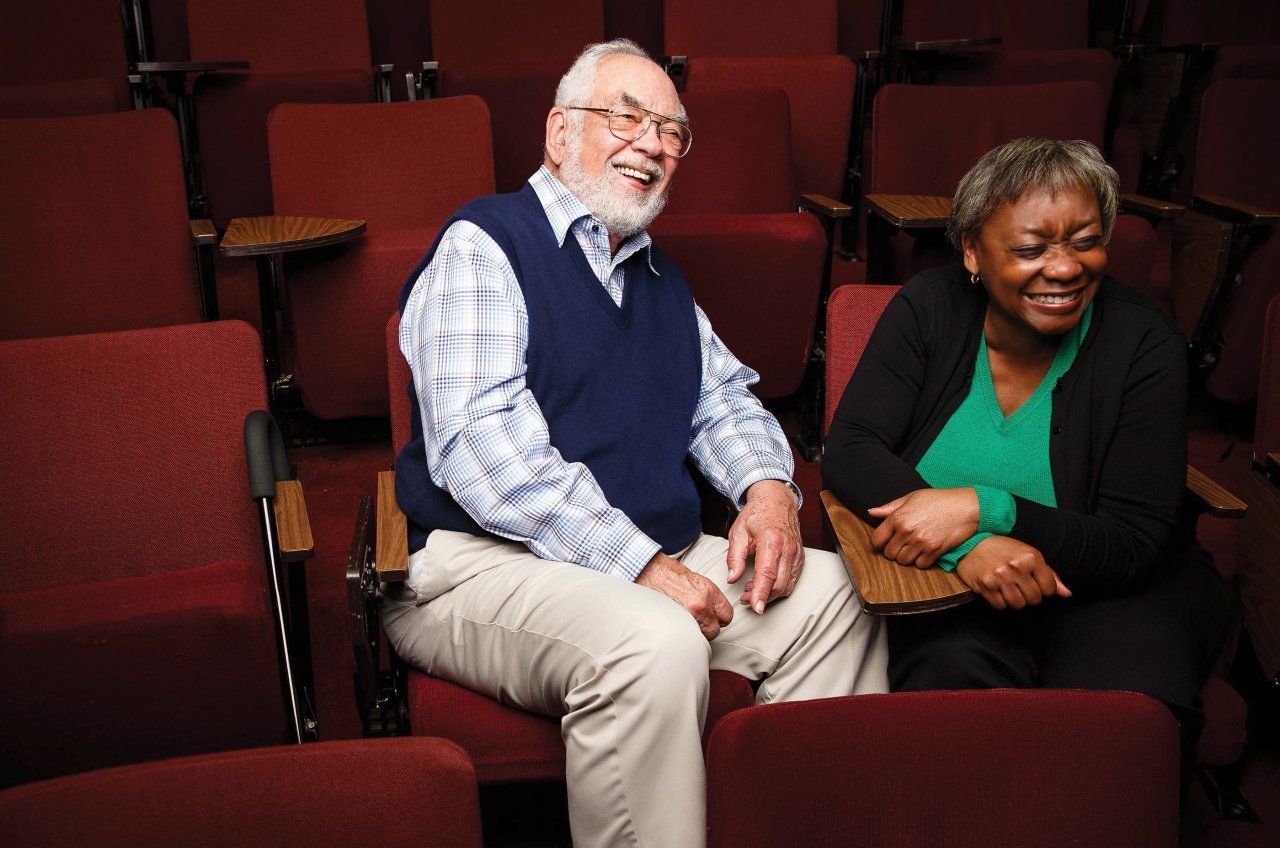
Robert Gibson and Sharon Youmans, photographed at UCSF’s Toland Hall on Feb. 21. Photo: Steve Babuljak
Robert Gibson, PharmD ’58; Fulbright Scholar; former associate vice chancellor and associate dean, UCSF School of Pharmacy; former president, American Pharmacists Association (APhA) and American Association of Colleges of Pharmacy; winner, Remington Honor Medal, highest award bestowed by the APhA
Sharon Youmans, PharmD ’85, MPH; vice dean and professor of clinical pharmacy, UCSF School of Pharmacy; fellow, APhA Academy of Pharmacy Practice and Management; six-time recipient, UCSF Apple Award for Teaching
Gibson: Sharon was quick and smart, not the least bit intimidated in her [admissions] interview with me. I was associate dean for student affairs and head of minority recruitment at the time. I think she knew what she wanted to do, and if I got in the way, the hell with it.
Youmans: He was very approachable, a gentle giant whom I felt I could go to with anything. He always had the students’ best interests at heart. Some weren’t prepared academically, through no fault of their own, and Doc was there for them. He touched hundreds of student lives over the decades.
Gibson: I liked her familiarity, but she was always respectful. From the very moment I met her, she called me “Doc,” and she has called me that ever since.
Youmans: He was very proactive in recruiting minority students and was passionate about inclusion and social justice. Many years later, I chaired a diversity task force, and he wrote a historical perspective for me. It talked about how denying minorities access to college was an issue in the ’70s. Decades later, it still is.
Gibson: I had a grant to increase minority representation in pharmacy, so I took Sharon to the American Association of Colleges of Pharmacy meetings, and other large professional gatherings, so she could meet the most important people in the profession. She was so bright; she didn’t need any introductions – she just jumped right in.
Youmans: My first professional meeting was in New Orleans; Bob was responsible for sending me there. Then, when I graduated, he wrote me a letter of recommendation for the residencies I applied to. A residency director told me that one of my letters made it sound like I walked on water, and I instantly knew he was referring to Doc’s. I never got to read it, but I did get the residency I wanted.
Gibson: Sharon is exuberant and intent. Even as a student, no matter the setting, she was always absolutely aware of where she was, who surrounded her, and what needed to be done. I don’t think you could surprise her. She might say she was surprised, but I wouldn’t believe her.
Youmans: Doc has a wonderful sense of humor. You wouldn’t guess that by looking at him, because he has such a regal and strong presence. But his laugh is his signature.
Gibson: I am not at all surprised to see that Sharon has been appointed vice dean. By god, she was always going to get it done. I am so proud to see a mentee earn a responsible role in the school. I didn’t get where I was all by myself. I needed help. So I turned around to prop open the door for someone who inspired me, and a bright, extremely competent woman just walked right in. And believe me, Sharon has shaken some of the old guard who still believe that years of submission to elders is the road to acceptance and the path to success.
Youmans: Our relationship has lasted over several decades now. When I was inducted as a fellow into the American Pharmacists Association, he was there – he led that trail. He taught me that you don’t have to let skin color stop you. Doc made his mark on me, the field, and UCSF. He embodies this place.
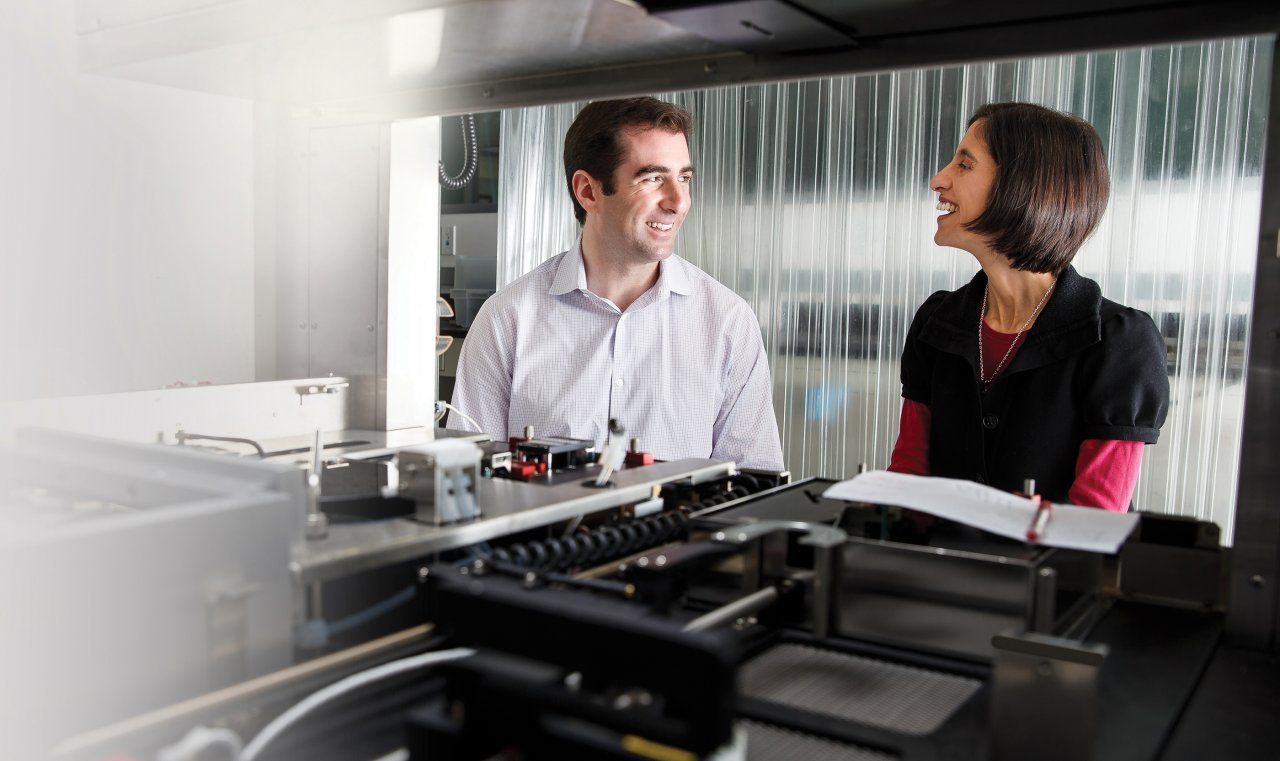
Adam Mendelsohn and Tejal Desai, photographed at Nano Precision Medical in Emeryville on March 7. Photo: Steve Babuljak
Tejal Desai, PhD ’98; vice chair and professor, Department of Bioengineering and Therapeutic Sciences, UCSF; winner, Paul Dawson Biotechnology Award, American Association of Colleges of Pharmacy; recipient, UCSF Dean’s Citation for Excellence in Teaching; winner, Eurand Pharmaceuticals Grand Prize for Innovative Approaches to Drug Delivery
Adam Mendelsohn, PhD ’11; co-founder, president, and CEO, Nano Precision Medical, Emeryville, Calif.; former director, UCSF Venture Innovation Program; president, UCSF Graduate Division Alumni Association
Mendelsohn: I remember meeting Tejal at an event to welcome new bioengineering students. She was remarkable in giving this impression of relaxation, while other professors seemed more stressed. Her work fascinated me. Lots of people wanted to work in her lab, so I had to be persistent.
Desai: Honestly, I didn’t know if Adam was going to be a good fit for the lab. But he just kept showing up at our meetings every single week. He would send me emails about what he wanted to work on – the ideas were all over the place. Ultimately, I realized that Adam is so bright that it didn’t really matter what he does, he would make it work. So I ended up asking him to join us.
Mendelsohn: Before I came to UCSF, I worked for companies in the diabetes field. The research Tejal did for her PhD was also in diabetes. My work in her lab was basically a continuation of her PhD project – to develop a device to deliver insulin using a hybrid of artificial and biological tissues. I was thinking about it as product development. That’s my background, and it was where I wanted to go.
Desai: I could see that Adam had this vision of creating a device that helps patients. But it’s a long road from here to there, with many mundane experiments along the way.
Mendelsohn: Time and again, I asked her whether or not it made sense to try something with the project, and she said, “Yeah, go for it.” So I did, and it wouldn’t work. Then I’d let her know it hadn’t worked, and she would tell me why. She knew that my work would be better and more efficient if I figured it out for myself.
Desai: You can’t mentor everybody in the same way; Adam taught me that. I could have told him, “Okay, you do this and this, and we’ll make sure you finish your PhD.” But I wanted him to find that moment where he understood why it was important to do the painstaking experimentation. And he did. He suddenly just dove in.
Mendelsohn: We founded our company right after graduation. Well, it kind of started before we finished. We won a UC Berkeley business plan competition, then another international competition at the Hong Kong University of Science and Technology. We got a second place at a competition in Boston. We had all the work done – the pitch, the plan.
Desai: Adam and his co-founders were learning how to start a company with stent technology we developed in the lab. They brought it forward, all the way out of our lab. I was peripherally involved. It was actually very, very good for me to learn that process.
Mendelsohn: Tejal taught me a lot about how to think about science and how to manage scientists. The effort she put into finding people who would collaborate well together – that’s the kind of environment I have tried to replicate at my company.
Desai: This is quintessential Adam – a master collaborator who always sees the big picture. One day he told me that he could introduce me to some of his industry contacts to develop a technology we were working on. Three phone calls later, we had what would become a five-year partnership and a new project. So sometimes I wonder if Adam thought of me as a mentor. I actually learned a lot from him while he was in my lab.
